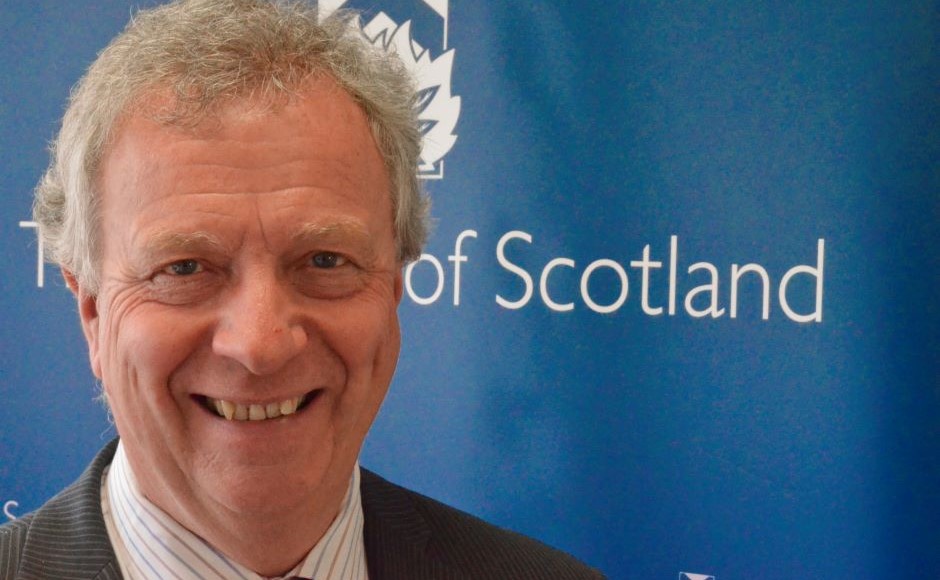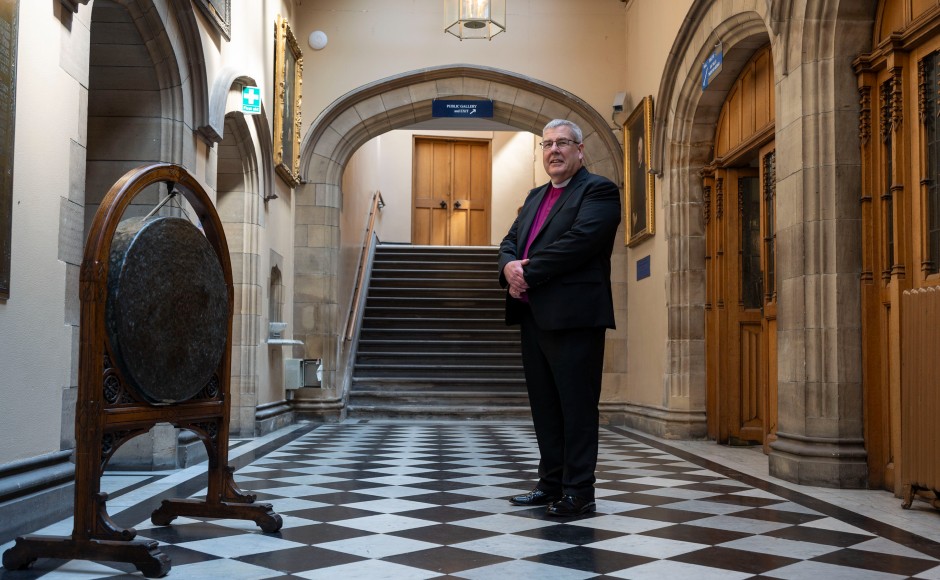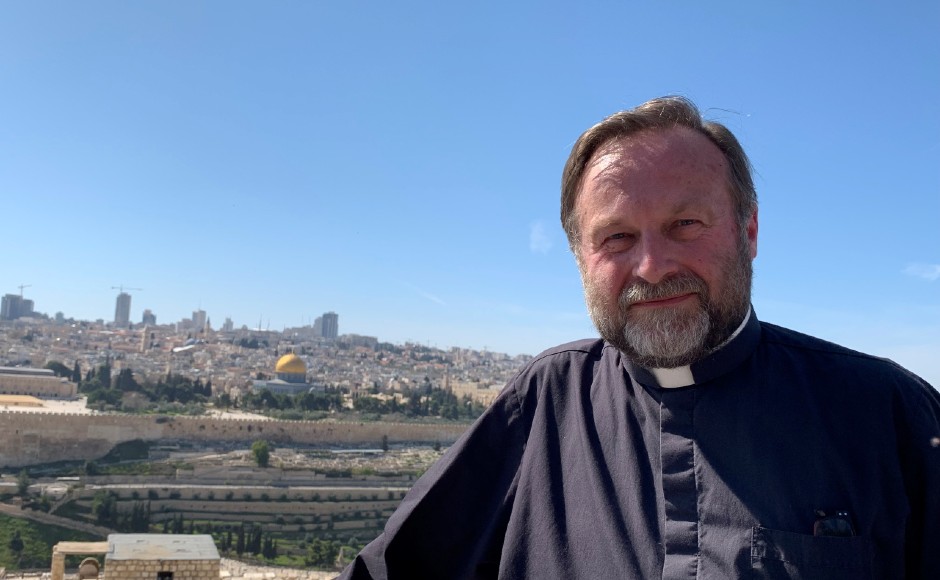General Assembly 2022 to receive progress report on Church reform
Published on 5 May 2022
Despite the challenges of the last two years, the Church of Scotland is steadily moving forward with a programme of radical reforms begun in 2019 aimed at ensuring it is "lean and fit for mission in the 21st century."

The reforms will streamline church structures through reducing the number of presbyteries, undertaking a large-scale review of Church buildings and developing new and creative mission plans that can be carried out with 600 full-time ministries supported by local elders and members.
"It is hard to remember a time in the recent history of the Church of Scotland when so many far-reaching instructions of the General Assembly have been implemented at the same time," the Assembly Trustees (ATs) say in their report to the 2022 General Assembly.
"Our belief, which we hope can be shared across the whole Church, is that in the grace of God the work which has begun will lead to renewal and growth."
The goal of the reforms is to ensure the Church continues to achieve its mission of "inspiring the people of Scotland and beyond with the Good News of Jesus Christ through enthusiastic worshipping, witnessing, nurturing and serving communities."
The challenges of ministry
The Assembly Trustees' report recognises the heavy burden that ministers have carried in championing reforms amid the pandemic.
Ministers have been expected to embrace new technologies and explain Covid regulations while engaging in everything from mission planning and building reviews to comforting grieving families.
"We must all offer thanks for the strengths allowed to many," the report says, "whether in full-time ministry, other ministries or support positions to bear not only their own burdens but to aid those who have struggled."
The ATs have charged forum staff with reimagining and revising the initial training programme for Ministers of Word and Sacrament as well as a programme of education and training open to all believers.
Finance during the pandemic
Commissioners to the 2022 General Assembly will receive reports that show the Church's financial situation is complex. To finance renewal, the Assembly Trustees have set out to rebalance the Church's finances, bring costs within budget and ensure presbyteries and local congregations are supported to grow. At the same time the pandemic led to many local congregations facing a significant drop in income and less overall income for the Church nationally.
As the ATs explain in the Annual Report:
"The 2019 Special Commission recommended eliminating deficit budgeting and the ATs want to implement this; however, because the pandemic reduced the Church's income substantially, there will be deficit budgets on ordinary operations for at least the next two to three years until (1) the new Presbyteries become fully operational, (2) the Faith Action Plan is established and (3) Presbytery Mission Plans have been completed."
However, this year's operating deficit of £3.1 million is less than budgeted and the Church remains on course. Despite the challenges of the pandemic, the ATs say in their report, "…people have been faithful: faithful to their calling, faithful in their service, faithful in their giving and faithful to God."
Giving to Grow
Approved by the 2021 General Assembly, a new financial structure will retire the Mission and Ministries system and introduce the Giving to Grow scheme, which will begin on 1 January 2023.
This year's Annual Report includes detailed proposals for Giving to Grow, which is based on the actual cost of a Minister of Word and Sacrament and aims to build and strengthen the local Church. To help congregations faced with higher contributions, the ATs have created transition funding which will come from reserves.
The ATs have also created new funds to support growth. The Seeds for Growth Fund, which had to be suspended during the pandemic and which promises up to £25m over the next 7 years, will now accept applications from January 2023 and the Pioneer Mission Fund, which opens this week, will provide individual grants of up to £10,000. A third fund, the 2022 Small Grants Fund will support short-term projects.
Very Rev Dr John Chalmers, Convener of the Assembly Trustees, said, "the opening of these funds is a signal of the Church's intention to provide new ways of reaching those generations that are missing from our pews."
The AT's report notes that CrossReach will continue to need financial support from Church reserves for the time being because of the difficulties facing the social care sector. At the same time, CrossReach has made considerable progress toward financial stability. Welcome investment from the Scottish Government has meant that pay and conditions for frontline care staff have improved over the last year, with all staff paid the National Living Wage and proactive discussions continuing on providing the Real Living Wage.
"We record our gratitude for the work of the staff in this arm of the Church as it provides social care across Scotland," the AT's report says. "Staff have courageously and inventively worked to keep people safe and in communication with their relatives, counsellors and support services."
Progress on Presbytery reform
The General Assembly of 2019 set the ambitious target of reducing the number of Scottish Presbyteries to around 12 by the General Assembly of 2024. It is now expected that by 2024 there will be 10 or 11 presbyteries in Scotland.
Since 2019, five approved presbyteries have already successfully been created:
- The Presbytery of Aberdeen and Shetland was created on 1 June 2020, uniting both presbyteries
- The Presbytery of Fife was created on 1 January 2021, uniting the presbyteries of Dunfermline, Kirkaldy and St Andrews
- The Presbytery of Clyde was created on 1 September 2020, uniting the presbyteries of Dumbarton and Greenock & Paisley
- The Presbytery of Forth Valley and Clydesdale was created on 1 January 2022, uniting the presbyteries of Lanark and Hamilton
- The Presbytery of Edinburgh and West Lothian was created on 1 January 2022, uniting both presbyteries
- The approved Presbytery of the South West is due to form on 30 September this year.
Currently still under discussion and due to report to this year's General Assembly are the Presbyteries of Lothians and Borders, Highlands and Hebrides, Perth, Forth Valley and Clydesdale (with the addition of Falkirk).
The proposed Presbytery of the North East and the Northern Isles is due to report to the General Assembly in 2023.
The Presbyteries of England and the International Charges remain in discussion on what Presbytery reform means for them in their unique positions.
The Faith Action Plan
Over the last three years central office budgets have been reviewed and downsized. Last year staff took part in a pay and grading review, due to complete its work this summer.
The central structures of the Church are also changing, with new proposals coming to commissioners in the AT's report. Last year's General Assembly approved the Faith Action Plan, which guides the work of national office staff. With the new Head of Faith Action now in place, a programme is being developed that will tightly focus on supporting local church and aligning work plans with the Five Marks of Mission.
After the 2020 General Assembly, the ATs set up a special task group to review how the Faith Action programme can best be delivered. The D10 group has now made its recommendations and its proposals will come before the 2022 General Assembly.
The key proposal is for the formation of an Active Faith Leadership Team, which will be accountable to the General Assembly, to champion the Faith Action Programme and oversee its work. Half of the team's members would be "suitably skilled" members drawn from each of the new Presbyteries.
Instead of the existing two forums, the group proposes to define four programme areas, each led by a convener appointed by the General Assembly who would also sit on the Active Faith Leadership Team. The proposed four programmes and working titles are:
- Mission: represents the Church and its mission both nationally and internationally. Includes international partnerships, Ecumenical Relations, Priority Areas, new ways of being church, digital ministries, and congregational engagement and support. This group would forge strong connections with The Guild.
- People and Training: would engage with recruitment and leadership, training and support for a Church that values the ‘ministry of all believers'. While much of this involves ongoing, daily work it also includes significant strategic and policy development, in line with the priorities of the Faith Action Plan.
- Resource and Presence: would support the ‘business' elements of the Faith Action Programme such as Life & Work magazine, the Storytelling Centre, and the Tiberias Hotel, the Jerusalem Guesthouse and Tabeetha School in Israel/Palestine, and on ways of helping to resource the Church's work.
- Public Life and Global Justice: engages in theological enquiry and reflection on issues of justice, ethics, public theology, political and social policies. Includes current work on the legacy of slavery and racial justice, climate change and net zero, migrants and refugees, drug addiction and substance misuse.
The conveners of the Active Faith Leadership Team and the four programmes would represent the team at the General Assembly and between Assemblies.
Other areas of work that are highlighted in the Assembly Trustees report are the Equality Diversity and Inclusion group, Stewardship and the Under-40s group.


